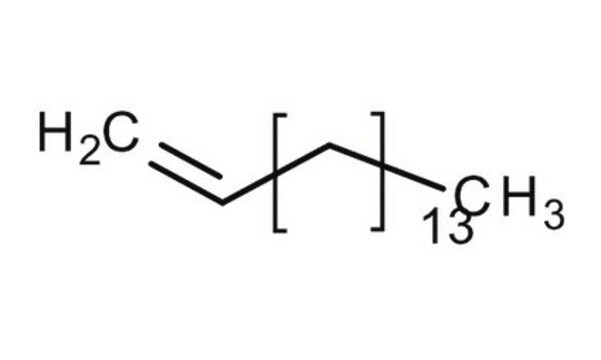52276
1-Hexadecene
analytical standard
Synonym(s):
Cetene
About This Item
Recommended Products
grade
analytical standard
Quality Level
vapor density
>0.8 (vs air)
vapor pressure
<0.2 mmHg ( 20 °C)
Assay
≥99.8% (GC)
autoignition temp.
464 °F
shelf life
limited shelf life, expiry date on the label
technique(s)
HPLC: suitable
gas chromatography (GC): suitable
refractive index
n20/D 1.441 (lit.)
n20/D 1.441
bp
274 °C (lit.)
mp
3-5 °C (lit.)
density
0.783 g/mL at 25 °C (lit.)
application(s)
environmental
petroleum
format
neat
SMILES string
CCCCCCCCCCCCCCC=C
InChI
1S/C16H32/c1-3-5-7-9-11-13-15-16-14-12-10-8-6-4-2/h3H,1,4-16H2,2H3
InChI key
GQEZCXVZFLOKMC-UHFFFAOYSA-N
Looking for similar products? Visit Product Comparison Guide
Application
Recommended products
Signal Word
Danger
Hazard Statements
Precautionary Statements
Hazard Classifications
Asp. Tox. 1
Storage Class Code
10 - Combustible liquids
WGK
WGK 1
Flash Point(F)
269.6 °F - closed cup
Flash Point(C)
132 °C - closed cup
Personal Protective Equipment
Regulatory Listings
Regulatory Listings are mainly provided for chemical products. Only limited information can be provided here for non-chemical products. No entry means none of the components are listed. It is the user’s obligation to ensure the safe and legal use of the product.
FSL
Group 4: Flammable liquids
Type 3 petroleums
Hazardous rank III
Water insoluble liquid
JAN Code
52276-5ML:
52276-BULK:
52276-VAR:
52276-1ML:
Choose from one of the most recent versions:
Already Own This Product?
Find documentation for the products that you have recently purchased in the Document Library.
Customers Also Viewed
Our team of scientists has experience in all areas of research including Life Science, Material Science, Chemical Synthesis, Chromatography, Analytical and many others.
Contact Technical Service








